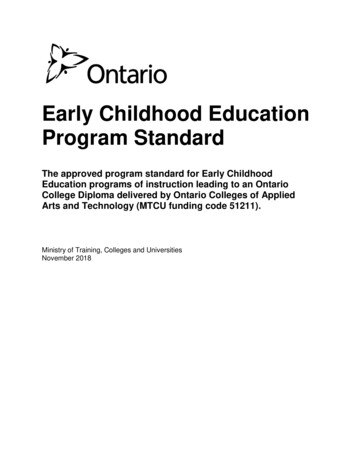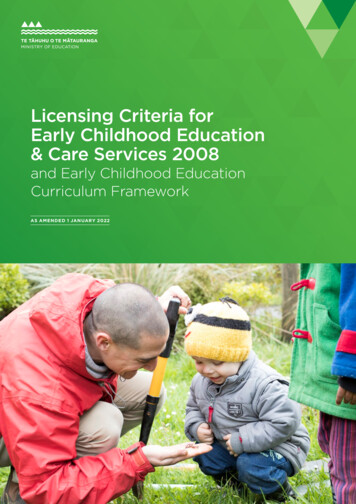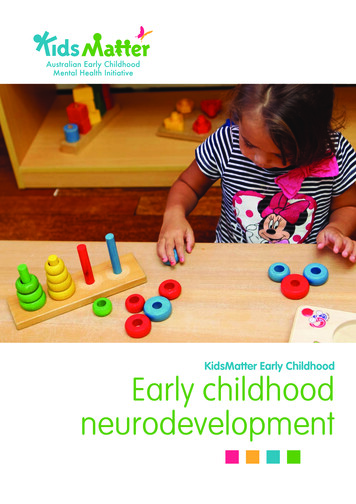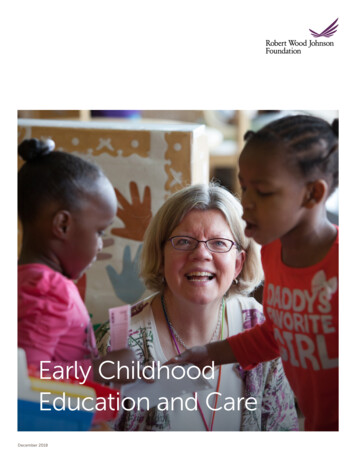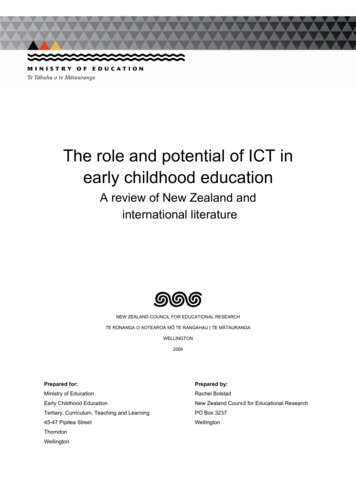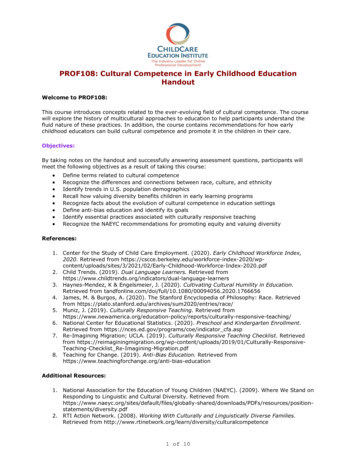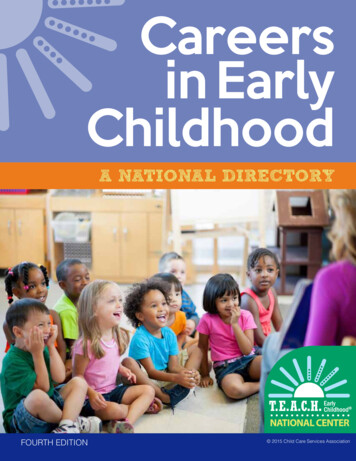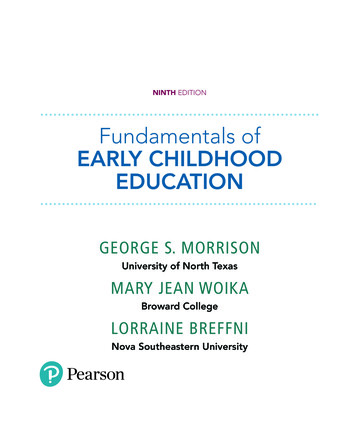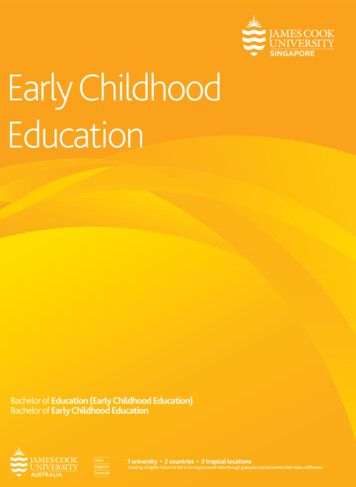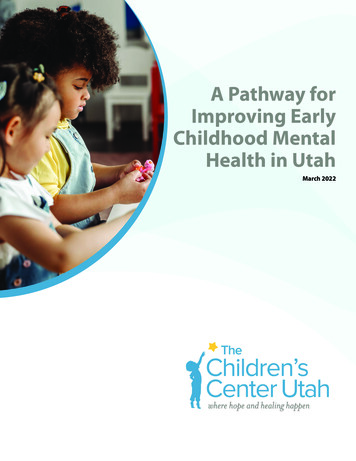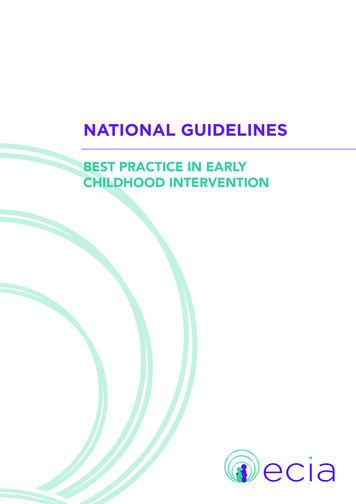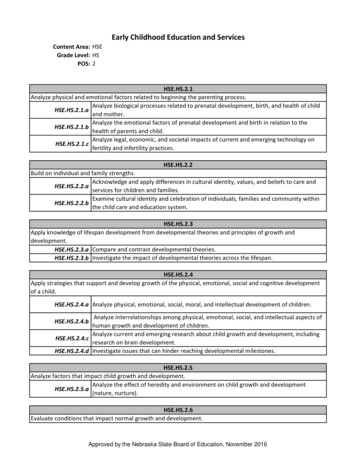
Transcription
Early Childhood Education and ServicesContent Area: HSEGrade Level: HSPOS: 2HSE.HS.2.1Analyze physical and emotional factors related to beginning the parenting process.Analyze biological processes related to prenatal development, birth, and health of childHSE.HS.2.1.aand mother.Analyze the emotional factors of prenatal development and birth in relation to theHSE.HS.2.1.bhealth of parents and child.Analyze legal, economic, and societal impacts of current and emerging technology onHSE.HS.2.1.cfertility and infertility practices.HSE.HS.2.2Build on individual and family strengths.Acknowledge and apply differences in cultural identity, values, and beliefs to care andHSE.HS.2.2.aservices for children and families.Examine cultural identity and celebration of individuals, families and community withinHSE.HS.2.2.bthe child care and education system.HSE.HS.2.3Apply knowledge of lifespan development from developmental theories and principles of growth anddevelopment.HSE.HS.2.3.a Compare and contrast developmental theories.HSE.HS.2.3.b Investigate the impact of developmental theories across the lifespan.HSE.HS.2.4Apply strategies that support and develop growth of the physical, emotional, social and cognitive developmentof a child.HSE.HS.2.4.a Analyze physical, emotional, social, moral, and intellectual development of children.Analyze interrelationships among physical, emotional, social, and intellectual aspects ofhuman growth and development of children.Analyze current and emerging research about child growth and development, includingHSE.HS.2.4.cresearch on brain development.HSE.HS.2.4.d Investigate issues that can hinder reaching developmental milestones.HSE.HS.2.4.bHSE.HS.2.5Analyze factors that impact child growth and development.Analyze the effect of heredity and environment on child growth and developmentHSE.HS.2.5.a(nature, nurture).HSE.HS.2.6Evaluate conditions that impact normal growth and development.Approved by the Nebraska State Board of Education, November 2016
Examine educational, community, and governmental resources available to preventdevelopmental delays.Identify educational, community, and governmental resources available to address andHSE.HS.2.6.bimprove developmental delays.Identify policies and programs in a variety of sectors that positively or negativelyHSE.HS.2.6.cinfluence healthcare, nutrition, education, child protection, and poverty.HSE.HS.2.6.aHSE.HS.2.7Demonstrate a safe and healthy learning environment for children.Manage physical space to maintain a learning environment that is safe and healthy andHSE.HS.2.7.aencourages physical activity.HSE.HS.2.7.b Apply safe and healthy practices that comply with state regulations.HSE.HS.2.7.c Plan safe and healthy meals and snacks.Document symptoms of child abuse and neglect and use appropriate procedures toHSE.HS.2.7.dreport suspected abuse or neglect to the designated authorities.Implement basic health practices and prevention procedures for workers and childrenHSE.HS.2.7.eregarding childhood illness and communicable diseases.HSE.HS.2.7.f Demonstrate security and emergency procedures.HSE.HS.2.8Demonstrate techniques for positive, collaborative relationships with children.HSE.HS.2.8.a Apply developmentally appropriate guidelines for behavior.Demonstrate interpersonal skills that promote positive and productive relationships withHSE.HS.2.8.bchildren.Implement strategies for constructive and supportive interactions between children andHSE.HS.2.8.cfamilies.HSE.HS.2.9Develop children's self-regulation of health and wellness choices to create a safe and healthy environment forchildren.HSE.HS.2.9.a Plan safe and healthy meals and snacks.HSE.HS.2.9.b Implement strategies to teach children health, safety, and sanitation habits.Critique behaviors (physical activity, nutrition choices, etc.) that develop positive lifelongHSE.HS.2.9.cwellness for children.HSE.HS.2.10Analyze the impact of early identification (high ability learner, children with special needs, language acquisition)for the child and how it paves the way for greater success in the future.Examine effective parenting practices and their role in helping children cope with aHSE.HS.2.10.avariety of challenges.HSE.HS.2.10.b Educate parents in their role to support developmental milestones of children.HSE.HS.2.11Analyze career paths within early childhood, education & related services.Explain the roles and functions of individuals engaged in early childhood, education, andHSE.HS.2.11.aservices.HSE.HS.2.11.b Analyze opportunities for employment and entrepreneurial endeavors.Approved by the Nebraska State Board of Education, November 2016
HSE.HS.2.11.cSummarize education and training requirements and opportunities for career paths inearly childhood, education, and services.HSE.HS.2.12Evaluate external support systems that provide services for parents.HSE.HS.2.12.a Explore nutrition programs.HSE.HS.2.12.b Interact with community resource leaders.Understand the practices promoted and resources provided by a child life specialistHSE.HS.2.12.c(medical personnel, child care provider, etc.).HSE.HS.2.12.d Communicate the processes for accessing resources.Advocate for family friendly policies with employers, businesses, and governmentHSE.HS.2.12.elegislation.Evaluate conditions (medical, living environment, financial, social, etc.) affectingHSE.HS.2.12.findividuals and families with a variety of disadvantaging conditions.HSE.HS.2.13Identify best practices for building partnerships between young children and their parents/community.Help individuals and communities to develop goals that promote success for parents andHSE.HS.2.13.afamilies.Apply culturally relevant information when building relationships with individuals andHSE.HS.2.13.btheir families.HSE.HS.2.14Analyze practices of community and government programs providing resources to families.Analyze professional, ethical, legal, and safety issues that confront human serviceHSE.HS.2.14.aemployees.Summarize licensing laws and regulations that affect service providers and theirHSE.HS.2.14.bparticipants.HSE.HS.2.14.c Analyze harmful, fraudulent, and deceptive human services practices.Summarize the rights and responsibilities of human service participants and theirHSE.HS.2.14.dfamilies.Analyze effective individual and family advocacy and self-advocacy strategies toHSE.HS.2.14.eovercome diverse challenges facing human services participants.HSE.HS.2.15Demonstrate professional practices and standards related to working with children.Apply the Code of Ethical Conduct set forth by the NAEYC (National Association for theHSE.HS.2.15.aEducation of Young Children).HSE.HS.2.15.b Utilize opportunities for continuing training and education.Demonstrate enthusiasm, initiative, and commitment to program goals andHSE.HS.2.15.cimprovements.Implement federal, state, and local licensing and certification guidelines when designingHSE.HS.2.15.dprograms.Apply business management skills to planning businesses in early childhood, education,HSE.HS.2.15.eand services.HSE.HS.2.16Approved by the Nebraska State Board of Education, November 2016
Demonstrate professional behaviors, skills, and knowledge in operating an early childhood care business.Demonstrate professional and ethical collaborative relationships with colleagues,HSE.HS.2.16.asupport teams, participants, and families.Apply rules, regulations, and work site policies that affect employer, employee,HSE.HS.2.16.bparticipant, and family rights and responsibilities.Maintain accurate and confidential documentation to be submitted in a timely mannerHSE.HS.2.16.cto appropriate sources.Analyze participants' strengths, needs, preferences, and interests across the life spanHSE.HS.2.16.dthrough formal and informal assessment practices.HSE.HS.2.16.e Demonstrate use of technology in human services.HSE.HS.2.17Apply knowledge about child development through practicum experiences.HSE.HS.2.17.a Develop observational learning skills.Analyze children's developmental progress and summarize developmental issues andHSE.HS.2.17.bconcerns.Defend an employment portfolio in applying for internships and work-based learningHSE.HS.2.17.copportunities in education and early childhood.HSE.HS.2.18Demonstrate techniques for positive interaction with children.HSE.HS.2.18.a Apply developmentally appropriate guidelines for behavior.HSE.HS.2.18.b Demonstrate problem-solving skills with children.Demonstrate interpersonal skills that promote positive and productive relationships withHSE.HS.2.18.cchildren.Implement strategies for constructive and supportive interactions between children andHSE.HS.2.18.dfamilies.HSE.HS.2.19Demonstrate integration of curriculum and instruction to meet children's developmental needs and interests.HSE.HS.2.19.a Analyze a variety of curriculum and instructional models.Implement learning activities in all curriculum areas that meet the developmental needsHSE.HS.2.19.bof children.Implement an integrated curriculum that incorporates a child's language, learning styles,HSE.HS.2.19.cearly experiences, and cultural values.HSE.HS.2.19.d Demonstrate a variety of teaching methods to meet individual needs of children.Arrange learning centers that provide for children's exploration, discovery, andHSE.HS.2.19.edevelopment.HSE.HS.2.19.f Establish activities, routines, and transitions.Apply a variety of assessment methods to observe and interpret children's growth andHSE.HS.2.19.gdevelopment.Approved by the Nebraska State Board of Education, November 2016
Child DevelopmentCourse DescriptionThis course integrates knowledge, skills and practices necessary for nurturing the growthand development of children. The study of the physical, emotional, social, andintellectual aspects related to prenatal through age 12 will be studied in addition to thepositive and negative factors that impact child growth and development.Course Code:090119Endorsements toTeach:FACSPrograms of Study towhich this CourseappliesHSE.HS.2 Early Childhood Education and ServicesHSE.HS.2.1Analyze physical and emotional factors related to beginning the parenting process.Analyze biological processes related to prenatal development, birth, and health of childHSE.HS.2.1.aand mother.Analyze the emotional factors of prenatal development and birth in relation to theHSE.HS.2.1.bhealth of parents and child.Analyze legal, economic, and societal impacts of current and emerging technology onHSE.HS.2.1.cfertility and infertility practices.HSE.HS.2.3Apply knowledge of lifespan development from developmental theories and principles of growth anddevelopment.HSE.HS.2.3.a Compare and contrast developmental theories.HSE.HS.2.3.b Investigate the impact of developmental theories across the lifespan.HSE.HS.2.4Apply strategies that support and develop growth of the physical, emotional, social and cognitive developmentof a child.HSE.HS.2.4.a Analyze physical, emotional, social, moral, and intellectual development of children.Analyze interrelationships among physical, emotional, social, and intellectual aspects ofhuman growth and development of children.Analyze current and emerging research about child growth and development, includingHSE.HS.2.4.cresearch on brain development.HSE.HS.2.4.d Investigate issues that can hinder reaching developmental milestones.HSE.HS.2.4.bHSE.HS.2.5Analyze factors that impact child growth and development.Approved by Nebraska State Board of Education, November 2016
HSE.HS.2.5.aAnalyze the effect of heredity and environment on child growth and development(nature, nurture).HSE.HS.2.6Evaluate conditions that impact normal growth and development.Examine educational, community, and governmental resources available to preventHSE.HS.2.6.adevelopmental delays.Identify educational, community, and governmental resources available to address andHSE.HS.2.6.bimprove developmental delays.Identify policies and programs in a variety of sectors that positively or negativelyHSE.HS.2.6.cinfluence healthcare, nutrition, education, child protection, and poverty.HSE.HS.2.17Apply knowledge about child development through practicum experiences.HSE.HS.2.17.a Develop observational learning skills.Approved by Nebraska State Board of Education, November 2016
Early Childhood Education and ServicesCourse DescriptionIn this course students will explore education and community resources available for theeducation and necessary services of young children. Students will be exposed toeducational needs and resources as well as begin the development of lesson plans andlesson plan components for the education of young children as well as the career skillsnecessary for a career in early childhood education and services.Course Code:090200Endorsements toTeach:FACSPrograms of Study towhich this CourseappliesHSE.HS.2 Early Childhood Education and ServicesHSE.HS.2.2Build on individual and family strengths.Acknowledge and apply differences in cultural identity, values, and beliefs to care andHSE.HS.2.2.aservices for children and families.Examine cultural identity and celebration of individuals, families and community withinHSE.HS.2.2.bthe child care and education system.HSE.HS.2.7Demonstrate a safe and healthy learning environment for children.Manage physical space to maintain a learning environment that is safe and healthy andHSE.HS.2.7.aencourages physical activity.HSE.HS.2.7.b Apply safe and healthy practices that comply with state regulations.HSE.HS.2.7.c Plan safe and healthy meals and snacks.Document symptoms of child abuse and neglect and use appropriate procedures toHSE.HS.2.7.dreport suspected abuse or neglect to the designated authorities.Implement basic health practices and prevention procedures for workers and childrenHSE.HS.2.7.eregarding childhood illness and communicable diseases.HSE.HS.2.7.f Demonstrate security and emergency procedures.HSE.HS.2.8Demonstrate techniques for positive, collaborative relationships with children.HSE.HS.2.8.a Apply developmentally appropriate guidelines for behavior.Demonstrate interpersonal skills that promote positive and productive relationships withHSE.HS.2.8.bchildren.Implement strategies for constructive and supportive interactions between children andHSE.HS.2.8.cfamilies.Approved by Nebraska State Board of Education, November 2016
HSE.HS.2.9Develop children's self-regulation of health and wellness choices to create a safe and healthy environment forchildren.HSE.HS.2.9.a Plan safe and healthy meals and snacks.HSE.HS.2.9.b Implement strategies to teach children health, safety, and sanitation habits.Critique behaviors (physical activity, nutrition choices, etc.) that develop positive lifelongHSE.HS.2.9.cwellness for children.HSE.HS.2.10Analyze the impact of early identification (high ability learner, children with special needs, language acquisition)for the child and how it paves the way for greater success in the future.Examine effective parenting practices and their role in helping children cope with aHSE.HS.2.10.avariety of challenges.HSE.HS.2.10.b Educate parents in their role to support developmental milestones of children.HSE.HS.2.11Analyze career paths within early childhood, education & related services.Explain the roles and functions of individuals engaged in early childhood, education, andHSE.HS.2.11.aservices.HSE.HS.2.11.b Analyze opportunities for employment and entrepreneurial endeavors.Summarize education and training requirements and opportunities for career paths inHSE.HS.2.11.cearly childhood, education, and services.HSE.HS.2.12Evaluate external support systems that provide services for parents.HSE.HS.2.12.a Explore nutrition programs.HSE.HS.2.12.b Interact with community resource leaders.Understand the practices promoted and resources provided by a child life specialistHSE.HS.2.12.c(medical personnel, child care provider, etc.).HSE.HS.2.12.d Communicate the processes for accessing resources.Advocate for family friendly policies with employers, businesses, and governmentHSE.HS.2.12.elegislation.Evaluate conditions (medical, living environment, financial, social, etc.) affectingHSE.HS.2.12.findividuals and families with a variety of disadvantaging conditions.HSE.HS.2.13Identify best practices for building partnerships between young children and their parents/community.Help individuals and communities to develop goals that promote success for parents andHSE.HS.2.13.afamilies.Apply culturally relevant information when building relationships with individuals andHSE.HS.2.13.btheir families.HSE.HS.2.14Analyze practices of community and government programs providing resources to families.Analyze professional, ethical, legal, and safety issues that confront human serviceHSE.HS.2.14.aemployees.Approved by Nebraska State Board of Education, November 2016
Summarize licensing laws and regulations that affect service providers and theirparticipants.HSE.HS.2.14.c Analyze harmful, fraudulent, and deceptive human services practices.Summarize the rights and responsibilities of human service participants and theirHSE.HS.2.14.dfamilies.Analyze effective individual and family advocacy and self-advocacy strategies toHSE.HS.2.14.eovercome diverse challenges facing human services participants.HSE.HS.2.14.bHSE.HS.2.15Demonstrate professional practices and standards related to working with children.Apply the Code of Ethical Conduct set forth by the NAEYC (National Association for theHSE.HS.2.15.aEducation of Young Children).HSE.HS.2.15.b Utilize opportunities for continuing training and education.Demonstrate enthusiasm, initiative, and commitment to program goals andHSE.HS.2.15.cimprovements.Implement federal, state, and local licensing and certification guidelines when designingHSE.HS.2.15.dprograms.Apply business management skills to planning businesses in early childhood, education,HSE.HS.2.15.eand services.HSE.HS.2.17Apply knowledge about child development through practicum experiences.HSE.HS.2.17.a Develop observational learning skills.Analyze children's developmental progress and summarize developmental issues andHSE.HS.2.17.bconcerns.HSE.HS.2.18Demonstrate techniques for positive interaction with children.HSE.HS.2.18.a Apply developmentally appropriate guidelines for behavior.HSE.HS.2.18.b Demonstrate problem-solving skills with children.Demonstrate interpersonal skills that promote positive and productive relationships withHSE.HS.2.18.cchildren.Implement strategies for constructive and supportive interactions between children andHSE.HS.2.18.dfamilies.HSE.HS.2.19Demonstrate integration of curriculum and instruction to meet children's developmental needs and interests.HSE.HS.2.19.a Analyze a variety of curriculum and instructional models.Implement learning activities in all curriculum areas that meet the developmental needsHSE.HS.2.19.bof children.Implement an integrated curriculum that incorporates a child's language, learning styles,HSE.HS.2.19.cearly experiences, and cultural values.HSE.HS.2.19.d Demonstrate a variety of teaching methods to meet individual needs of children.Arrange learning centers that provide for children's exploration, discovery, andHSE.HS.2.19.edevelopment.HSE.HS.2.19.f Establish activities, routines, and transitions.Approved by Nebraska State Board of Education, November 2016
HSE.HS.2.19.gApply a variety of assessment methods to observe and interpret children's growth anddevelopment.Approved by Nebraska State Board of Education, November 2016
Early Childhood Education PracticumCourse DescriptionThis course is designed to provide students a hands-on early childhood educationexperience. Course time is used as an interactive learning environment in whichstudents are actively teaching young children. Students will compile their informationtoward an employment portfolio.Course Code:090201Endorsements toFACSPrograms of Study towhich this CourseappliesHSE.HS.2 Early Childhood Education and ServicesHSE.HS.2.15Demonstrate professional practices and standards related to working with children.Apply the Code of Ethical Conduct set forth by the NAEYC (National Association for theHSE.HS.2.15.aEducation of Young Children).HSE.HS.2.15.b Utilize opportunities for continuing training and education.Demonstrate enthusiasm, initiative, and commitment to program goals andHSE.HS.2.15.cimprovements.HSE.HS.2.15.d Implement federal, state, and local licensing and certification guidelines when designingHSE.HS.2.15.e Apply business management skills to planning businesses in early childhood, education,HSE.HS.2.16Demonstrate professional behaviors, skills, and knowledge in operating an early childhood care E.HS.2.16.dHSE.HS.2.16.eDemonstrate professional and ethical collaborative relationships with colleagues,support teams, participants, and families.Apply rules, regulations, and work site policies that affect employer, employee,Maintain accurate and confidential documentation to be submitted in a timely mannerAnalyze participants' strengths, needs, preferences, and interests across the life spanDemonstrate use of technology in human services.HSE.HS.2.17Apply knowledge about child development through practicum experiences.Defend an employment portfolio in applying for internships and work-based learningHSE.HS.2.17.copportunities in education and early childhood.HSE.HS.2.18Demonstrate techniques for positive interaction with children.HSE.HS.2.18.a Apply developmentally appropriate guidelines for behavior.HSE.HS.2.18.b Demonstrate problem-solving skills with children.Demonstrate interpersonal skills that promote positive and productive relationships withHSE.HS.2.18.cchildren.Approved by Nebraska State Board of Education, November 2016
HSE.HS.2.18.dImplement strategies for constructive and supportive interactions between children andfamilies.HSE.HS.2.19Demonstrate integration of curriculum and instruction to meet children's developmental needs and SE.HS.2.19.eHSE.HS.2.19.fHSE.HS.2.19.gImplement learning activities in all curriculum areas that meet the developmental needsof children.Implement an integrated curriculum that incorporates a child's language, learning styles,early experiences, and cultural values.Demonstrate a variety of teaching methods to meet individual needs of children.Arrange learning centers that provide for children's exploration, discovery, anddevelopment.Establish activities, routines, and transitions.Apply a variety of assessment methods to observe and interpret children's growth anddevelopment.Approved by Nebraska State Board of Education, November 2016
Knowledge and Skill StatementsKSS 1 Investigate parenting practices to support optimal development.KSS 2 Assess practices to promote health and wellness.KSS 3 Assess development to support individuals and families.KSS 4 Explore/interact with community & government resources available to individuals andfamilies.KSS 5 Investigate/Evaluate business operations following licensing and certification guidelines.KSS 6 Experience comprehensive early childhood practicum.KSS 7 Appreciate individual and cultural diversity with children and families.Approved by Nebraska State Board of Education, November 2016
Defend an employment portfolio in applying for internships and work-based learning opportunities in education and early childhood. HSE.HS.2.18.a Apply developmentally appropriate guidelines for behavior. HSE.HS.2.18.b Demonstrate problem-solving skills with children. HSE.HS.2.18.c
